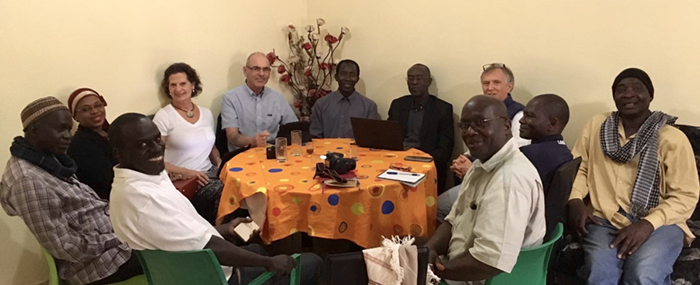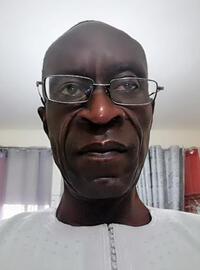What The Urantia Book Means to Me - Moustapha N’Diaye
What The Urantia Book Means to Me - Moustapha N’Diaye
By Moustapha N’Diaye, Senegal
For as long as can remember—as is probably true for most men and women—I have always asked myself questions, consciously or unconsciously, about explanations of things and phenomena around me. It was mostly about natural phenomena, especially when they attained frightening proportions, like storms. The same questions arose in other forms every time I learned that an old person I knew had just died. The death of a young person seemed even more terrible.
As I grew up and finished learning to read and write, I was interested in deciphering everything around me, especially things that I did not understand, or rather that I understood in my own way. Topics of interest were: psychology, esotericism, occultism, God, religion, hermeticism, theosophy, divine sciences, and sacred arts. There took form in my developing mind, as early as primary school, an interest in understanding the answers to the scientific questions of “how,” and to the more difficult questions of “why.”
However, it was not really a conscious quest—at least not yet. It continued during my high school years in a military academy in the city of Saint Louis, located 270 kilometers (167 miles) from the city of Dakar, where I was born and grew up. After graduating in 1975, I pursued engineering studies in Lyon, France. This time there emerged a real questioning of the order of science and the very purpose of life.
During the five years I spent in France, I read hundreds of works in the esoteric bookshops of Lyon, some in their entirety and some in part. I realized very quickly that most of these books went in circles with no outcomes. So when I visited home in Senegal and discovered that my father had started a study circle, I eagerly participated. Their study took the form of questions and answers on all subjects, without exception. This circle was composed of about 50 people, young academics for the most part, with women in the majority, who were meeting every Saturday afternoon in the home where I grew up.
I soon realized that the answers given to the various questions were far more satisfying to my mind and made me more conscious of my soul, than all that I had acquired from reading all those books.
In 1981, a very personal and highly impressive experience helped me change my approach to the understanding of living reality. In fact, this experience—a response to a very personal prayer—made me clearly understand that God is not outside of us, but within us. This experience also made me understand that when we pray to God within, His answers come through the world outside of us.
That year, the study circle decided to seek a direct and structured teaching and replaced the forum of questions and answers on Saturday afternoons. Since then, the group has had a structured teaching format and has provided spiritual education to several hundred people, mostly of Muslim faith (Senegal being a predominantly Muslim country), but also to some Christians. We are currently on the third batch of students who have become teachers themselves.
We came to realize that we owed this intellectual and spiritual clarity, coordinated with our personalities, to an intelligent implementation of the truths of The Urantia Book, adapted to our cultural and social setting. Our teacher had received the first French translation, La Cosmogonie d’Urantia, in the sixties from the translator, Jacques Weiss. In 1998, at the request of our study group, I phoned Urantia Foundation. Because I spoke French, my call was redirected to Trustee Georges Michelson-Dupont in France, and so our link was established with the Urantia movement.
The first face-to-face contact with readers outside our group took place in December 1998. Georges connected us with Norman Ingram, who was distributing English copies of The Urantia Book in English-speaking African countries. He needed a contact in Senegal (a French-speaking country) to pick up the books that were shipped from the port of Marseille to the port of Dakar. Norman had planned to stay two or three days in Dakar before continuing his drive to South Africa, but ended up staying in my home for almost a month. That is how we received our first Urantia Books in English.
Looking back, I now realize that through all this adventure characterized by an early interest in reading all kinds of religious literature, my Thought Adjuster was preparing me for the progressive and ever-expanding expression of God in my spiritual growth. I could not have fully appreciated the value of the teachings of The Urantia Book if I had not followed this chaotic path in my personal search. I now see that The Urantia Book is much more than just another religious book. The Urantia Book is a prodigious and indispensable "toolbox" for future teachers, whatever the human framework in which they must operate. It presents, with authority and wisdom, the heart of all human religious traditions that recognize the inner life and the Thought Adjuster.
The book also provides, in a human sense, an ideal framework for all human thought that is not strictly religious but is responsive to truth, as is all normal thought by creation. Finally, it has allowed me to see for myself how much the spiritual sharing with other people of the manifestations of our personal faith, however different and even divergent, is possible—when it is founded on the sincerity of the personal search, on the truths of the teachings of The Urantia Book, and on the love of God that is illustrated so perfectly by the life in the flesh of the Master Son of our local universe.

Assane Diagne, Ndiawar Ndiaye, Salimata Bamba Diagne, Line St- Pierre, Gaétan Charland, Amadou Diagne, Moustapha Ndiaye, Guy Perron, Cheikh Ndiaye, Lamine Ndour, Khatabe Ndiaye
